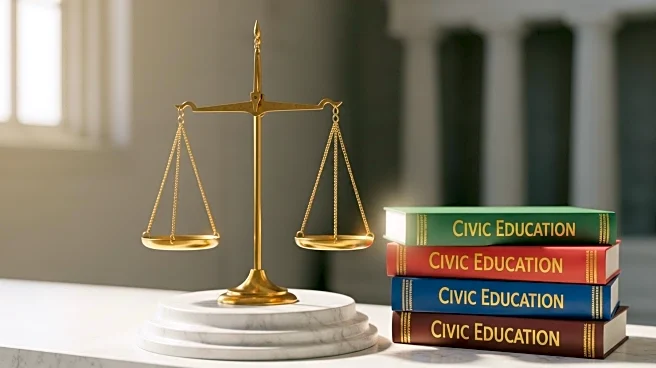What's Happening?
Supreme Court Justice Sonia Sotomayor has called for increased civic involvement and education, expressing concern that many Americans may not understand the fundamental differences between a president and a king. Speaking at the New York Law School, Sotomayor emphasized the importance of understanding American law and governance. Her remarks come as the Supreme Court is reviewing several appeals related to President Trump's executive powers, including his ability to impose tariffs and dismiss leaders of independent agencies. Sotomayor, appointed by President Obama, has often dissented in cases where the court has expanded presidential powers, warning of a shift in the relationship between the president and the public.
Why It's Important?
Justice Sotomayor's comments highlight ongoing debates about the balance of power within the U.S. government, particularly concerning the executive branch. Her call for civic education underscores the need for public understanding of governmental structures and the limits of presidential authority. This issue is significant as it affects how citizens perceive and engage with democratic processes. The Supreme Court's decisions on these matters could have lasting impacts on executive power and the role of checks and balances in U.S. governance, potentially influencing future administrations and public policy.
What's Next?
The Supreme Court's upcoming decisions on the appeals challenging President Trump's executive powers will be closely watched. These rulings could redefine the scope of presidential authority and set precedents for future administrations. Stakeholders, including political leaders and civil society groups, may respond with increased advocacy for or against the expansion of executive power. Additionally, Sotomayor's emphasis on civic education may inspire initiatives aimed at improving public understanding of government functions and encouraging civic engagement.
Beyond the Headlines
Sotomayor's remarks also touch on broader themes of democratic education and the role of the judiciary in safeguarding constitutional principles. Her concerns about the public's understanding of government structures reflect deeper issues in civic education, which may influence how citizens participate in democracy. The discussion raises ethical questions about the responsibilities of educational institutions in fostering informed citizenship and the judiciary's role in maintaining checks and balances.










